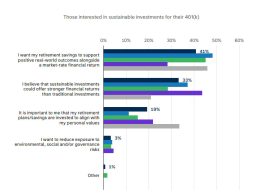Tariffs and escalating trade disputes have overtaken all other external threats as the biggest supply chain risk for US businesses, according to new research from EcoVadis. The second instalment of the 2025 US Business Sustainability Landscape Outlook reveals that 72% of senior US executives view tariffs and trade wars as their most significant external vulnerability.
The rising pressure is reshaping corporate decision-making: more than half of respondents (56%) say tariff policies are pushing them to compromise on sustainability or ESG priorities, with 22% reporting that these trade-offs will be substantial. Only 23% intend to uphold ESG commitments regardless of cost or trade-related disruptions.
While tariffs dominate overall, the report highlights sharp divisions in how leaders across organisational levels perceive emerging risks. C-suite executives are increasingly concerned about wider destabilising factors, with 41% pointing to extreme climate events and 40% citing geopolitical conflict. Directors and VPs, meanwhile, are more focused on operational disruptions such as cyber threats and labour issues (both 36%) and the challenge of ESG regulatory compliance across jurisdictions (33%).
Risk and compliance teams diverge further still, identifying cyber threats (63%) as their primary concern—surpassing tariffs (58%) and labour disruptions (42%). Finance, supply chain, and procurement leaders all cite tariffs as their top pressure point but differ in their secondary risks, ranging from cyber threats and climate shocks to geopolitical instability and cross-border ESG compliance.
“Tariffs and trade wars are intensifying the pressure on supply chains and exposing cracks in sustainability commitments,” said Pierre-François Thaler, co-founder and co-CEO of EcoVadis. “Leaders are being forced to make trade-offs in real time. The companies that will come out ahead are those using supplier intelligence to anticipate risk, diversify, and avoid letting short-term shocks derail long-term resilience.”
The findings come amid ongoing disruption across global supply chains. Nearly half of surveyed companies (44%) experienced between four and ten disruptions in the past year, linked to third-party failures, labour issues, trade disputes, or environmental events. A further 22% faced 11 or more.
To strengthen resilience, organisations are taking a range of actions:
- 61% are collaborating with value chain partners to redesign products or services to reduce upstream exposure.
- 56% are expanding second- and third-tier sourcing strategies.
- 52% are stepping up supplier engagement on ESG issues.
- 51% are shifting sourcing away from high-risk regions.
- 36% are investing in enhanced supplier risk management systems.
- 20% are turning to continuity insurance.
The report also uncovers troubling trends. Sixteen per cent of surveyed companies admit to concealing significant sustainability risks within their supply chains—rising to 30% among firms with revenues above $20 billion. Despite worsening extreme weather events, 21% of companies have yet to take any action on climate-related supply chain risks.
The study is based on a survey of 400 US executives from companies with annual revenues exceeding $1 billion across consumer, industrial, technology, and services sectors. The first part of the series concluded that most companies continue to invest in sustainability initiatives despite regulatory uncertainty and growing instances of greenhushing.





















